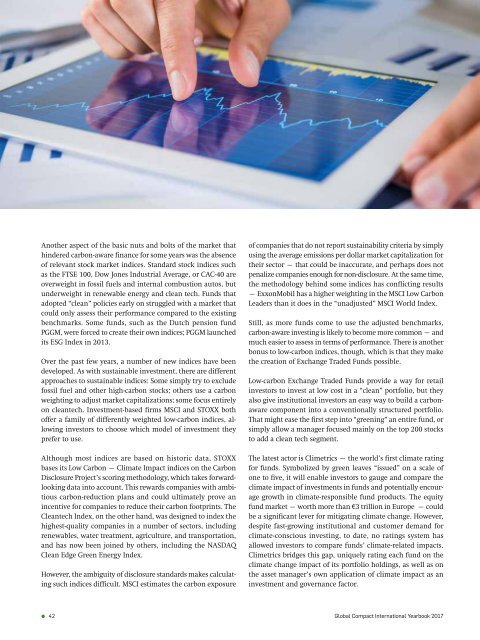Global Compact International Yearbook 2017
Sustainability in Troubled Times We life in times of uncertainty and global (dis)Order. „Understanding global mega-trends is crucial. We live in times of multiple, evolving and mutually-reinforcing shifts“, says UN Secretary-General António Guterres. He adds: „These dynamics, of geopolitical, demographic, climatic, technological, social and economic nature, enhance threats and opportunities on an unprecedented scale.“ Therefore sustainability in troubled times is the key topic of the Global Compact International Yearbook 2017, edited by macondo publishing.
Sustainability in Troubled Times
We life in times of uncertainty and global (dis)Order. „Understanding global mega-trends is crucial. We live in times of multiple, evolving and mutually-reinforcing shifts“, says UN Secretary-General António Guterres. He adds: „These dynamics, of geopolitical, demographic, climatic, technological, social and economic nature, enhance threats and opportunities on an unprecedented scale.“ Therefore
sustainability in troubled times is the key topic of the Global Compact International Yearbook 2017, edited by macondo publishing.
Create successful ePaper yourself
Turn your PDF publications into a flip-book with our unique Google optimized e-Paper software.
Another aspect of the basic nuts and bolts of the market that<br />
hindered carbon-aware finance for some years was the absence<br />
of relevant stock market indices. Standard stock indices such<br />
as the FTSE 100, Dow Jones Industrial Average, or CAC-40 are<br />
overweight in fossil fuels and internal combustion autos, but<br />
underweight in renewable energy and clean tech. Funds that<br />
adopted “clean” policies early on struggled with a market that<br />
could only assess their performance compared to the existing<br />
benchmarks. Some funds, such as the Dutch pension fund<br />
PGGM, were forced to create their own indices; PGGM launched<br />
its ESG Index in 2013.<br />
Over the past few years, a number of new indices have been<br />
developed. As with sustainable investment, there are different<br />
approaches to sustainable indices: Some simply try to exclude<br />
fossil fuel and other high-carbon stocks; others use a carbon<br />
weighting to adjust market capitalizations; some focus entirely<br />
on cleantech. Investment-based firms MSCI and STOXX both<br />
offer a family of differently weighted low-carbon indices, allowing<br />
investors to choose which model of investment they<br />
prefer to use.<br />
Although most indices are based on historic data, STOXX<br />
bases its Low Carbon – Climate Impact indices on the Carbon<br />
Disclosure Project’s scoring methodology, which takes forwardlooking<br />
data into account. This rewards companies with ambitious<br />
carbon-reduction plans and could ultimately prove an<br />
incentive for companies to reduce their carbon footprints. The<br />
Cleantech Index, on the other hand, was designed to index the<br />
highest-quality companies in a number of sectors, including<br />
renewables, water treatment, agriculture, and transportation,<br />
and has now been joined by others, including the NASDAQ<br />
Clean Edge Green Energy Index.<br />
However, the ambiguity of disclosure standards makes calculating<br />
such indices difficult. MSCI estimates the carbon exposure<br />
of companies that do not report sustainability criteria by simply<br />
using the average emissions per dollar market capitalization for<br />
their sector – that could be inaccurate, and perhaps does not<br />
penalize companies enough for non-disclosure. At the same time,<br />
the methodology behind some indices has conflicting results<br />
– ExxonMobil has a higher weighting in the MSCI Low Carbon<br />
Leaders than it does in the “unadjusted” MSCI World Index.<br />
Still, as more funds come to use the adjusted benchmarks,<br />
carbon-aware investing is likely to become more common – and<br />
much easier to assess in terms of performance. There is another<br />
bonus to low-carbon indices, though, which is that they make<br />
the creation of Exchange Traded Funds possible.<br />
Low-carbon Exchange Traded Funds provide a way for retail<br />
investors to invest at low cost in a “clean” portfolio, but they<br />
also give institutional investors an easy way to build a carbonaware<br />
component into a conventionally structured portfolio.<br />
That might ease the first step into “greening” an entire fund, or<br />
simply allow a manager focused mainly on the top 200 stocks<br />
to add a clean tech segment.<br />
The latest actor is Climetrics – the world’s first climate rating<br />
for funds. Symbolized by green leaves “issued” on a scale of<br />
one to five, it will enable investors to gauge and compare the<br />
climate impact of investments in funds and potentially encourage<br />
growth in climate-responsible fund products. The equity<br />
fund market – worth more than €3 trillion in Europe – could<br />
be a significant lever for mitigating climate change. However,<br />
despite fast-growing institutional and customer demand for<br />
climate-conscious investing, to date, no ratings system has<br />
allowed investors to compare funds’ climate-related impacts.<br />
Climetrics bridges this gap, uniquely rating each fund on the<br />
climate change impact of its portfolio holdings, as well as on<br />
the asset manager’s own application of climate impact as an<br />
investment and governance factor.<br />
42<br />
<strong>Global</strong> <strong>Compact</strong> <strong>International</strong> <strong>Yearbook</strong> <strong>2017</strong>

















